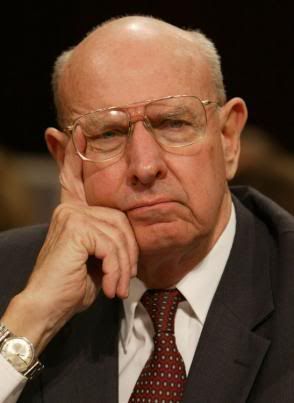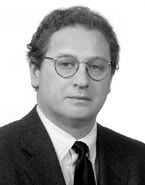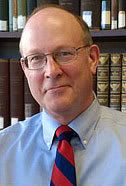Will be on CSPAN3 and the Committee stream.
Meteor Blades has a great roundup of today’s witnesses (actually, his entire post is worth a read, as always with him).
They are:
 Thomas Pickering is a career diplomat who served as U.S. ambassador to Jordan (1974–1978), Nigeria (1981–1983), El Salvador (1983–1985), Israel (1985–1988), the United Nations (1989-1992), India (1992–1993) and Russia (1993–1996). He is now vice chairman of Hills & Company, and is co-chair of the 14-year-old International Crisis Group. Three weeks ago Pickering signed a letter to President Obama seeking a commission to look into the detention, treatment, and transfer of captives after September 11.
Thomas Pickering is a career diplomat who served as U.S. ambassador to Jordan (1974–1978), Nigeria (1981–1983), El Salvador (1983–1985), Israel (1985–1988), the United Nations (1989-1992), India (1992–1993) and Russia (1993–1996). He is now vice chairman of Hills & Company, and is co-chair of the 14-year-old International Crisis Group. Three weeks ago Pickering signed a letter to President Obama seeking a commission to look into the detention, treatment, and transfer of captives after September 11.
 Vice Admiral Lee Gunn (Ret.), who served in the final three years of his 35-year military career as Inspector General of the Department of the Navy, is now president of the Institute of Public Research at the CNA Corporation, and president of the 2-year-old American Security Project, which sees its mission as "promoting debate about the appropriate use of American power, and cultivating strategic responses to 21st century challenges."
Vice Admiral Lee Gunn (Ret.), who served in the final three years of his 35-year military career as Inspector General of the Department of the Navy, is now president of the Institute of Public Research at the CNA Corporation, and president of the 2-year-old American Security Project, which sees its mission as "promoting debate about the appropriate use of American power, and cultivating strategic responses to 21st century challenges."
 John J. Farmer Jr., the former attorney general of New Jersey was Senior Counsel to the 9/11 Commission. He is a partner at Arsenault, Whipple, Farmer, Fasset and Azzarello, L.L.P. and an adjunct professor at Rutgers School of Law-Newark. He wrote "The Rule of Law in an Age of Terror" for the Rutgers University Law Review (2005).
John J. Farmer Jr., the former attorney general of New Jersey was Senior Counsel to the 9/11 Commission. He is a partner at Arsenault, Whipple, Farmer, Fasset and Azzarello, L.L.P. and an adjunct professor at Rutgers School of Law-Newark. He wrote "The Rule of Law in an Age of Terror" for the Rutgers University Law Review (2005).
 Frederick A. O. Schwarz, Jr. Chief Counsel at the Brennan Center for Justice and chief counsel for Senate Select Committee to Study Governmental Operations with Respect to Intelligence Activity (1975-1976), widely known as the Church Committee for its chairman, Idaho Senator Frank Church. His latest book, written with Aziz Z. Huq, is Unchecked and Unbalanced: Presidential Power in a Time of Terror
Frederick A. O. Schwarz, Jr. Chief Counsel at the Brennan Center for Justice and chief counsel for Senate Select Committee to Study Governmental Operations with Respect to Intelligence Activity (1975-1976), widely known as the Church Committee for its chairman, Idaho Senator Frank Church. His latest book, written with Aziz Z. Huq, is Unchecked and Unbalanced: Presidential Power in a Time of Terror
 David B. Rivkin, Jr. is a partner with Baker & Hostetler, L.L.P. He was chief counsel of the President’s Council on Competitiveness at the White House under George H.W. Bush, where he was in charge of a review of government regulations. He later coordinated the development and implementation of the first Bush’s deregulation efforts. He has argued that the United States has not violated the Geneva Conventions with its captured prisoner policy and that it was a few "bad apples" and not policy that was responsible for what happened at Abu Ghraib and elsewhere, and opposed appointment of a special prosecutor in the Lewis "Scooter" Libby affair.
David B. Rivkin, Jr. is a partner with Baker & Hostetler, L.L.P. He was chief counsel of the President’s Council on Competitiveness at the White House under George H.W. Bush, where he was in charge of a review of government regulations. He later coordinated the development and implementation of the first Bush’s deregulation efforts. He has argued that the United States has not violated the Geneva Conventions with its captured prisoner policy and that it was a few "bad apples" and not policy that was responsible for what happened at Abu Ghraib and elsewhere, and opposed appointment of a special prosecutor in the Lewis "Scooter" Libby affair.
 Jeremy Rabkin, a renowned scholar of internationalaw, is a professor at George Mason University School of Law in Arlington, Va. A member of the board of directors of the United States Institute of Peace and author, most recently, of the Law without Nations?: Why Constitutional Government Requires Sovereign States. He has argued that all Presidents stretch the law in times of war, but that the U.S. always regains its balance afterward.
Jeremy Rabkin, a renowned scholar of internationalaw, is a professor at George Mason University School of Law in Arlington, Va. A member of the board of directors of the United States Institute of Peace and author, most recently, of the Law without Nations?: Why Constitutional Government Requires Sovereign States. He has argued that all Presidents stretch the law in times of war, but that the U.S. always regains its balance afterward.
Leahy: Starts by emphasizing this as a time to pull together. "I suggested a middle ground in a way" that everyone can kumbaya.
Consitution not something an Administration can switch on or off at will. Commission is not something to be opposed, it’s an opportunity to come together. If one party remains absent or resistent, the opportunity can be lost, and calls for accountability via more traditional means will grow louder.
[Shorter Leahy, get on board now, you apologists, or we’re going to indictments. We’re being used as the pressure point on Republicans to make them accept this approach.]
Specter: Post-9/11 greatest expansion of executive power in our history. I said we don’t need a Truth Commission because you can just walk in and access the filing cabinets to get what you want. The release of the "unusual" OLC opinions. Very curious doctrine of self-defense. And OPR examining whether political appointees knowingly signed off on program wanted by White House officials. If they did it knowingly, it may fall within criminal conduct. We undertake those investigations where there is a predicate. We don’t go off helter skelter.
[Submits Hans vons Spakovsky article claiming this will be a HUAC. I guess Arlen is feeling the heat in PA. Jeebus, I’ve had enough from one-bullet Haggis. He also suggests that because the OLC opinions from Yoo are so bad, we ought to hold up the Johnsen confirmation.]
Feingold (notes he has to go hang with UK’s Prime Minister): Lists the things Obama has done well so far. Please Obama recognizes the need to take these actions. Crucial part is detailed accounting of what the Administration did in the last eight years. Should not settle scores. But also not rule out prosecution. Immunity for low-level participants. How to do this will be part of this hearing. I do support independent committee rather than regular committee. A truth commission is the best way to get the comprehensive story out to the world. Commission of inquiry best way to get facts out, Congress and Administration and public should decide what to do with it. I’d rather see investigative professionals on this commission than policy makers and politicians.
Pickering: Essential to understand what happened to chart right course. Urge you to support commission. (Only touches on detainee treatment.) This is a critical step in neutralizing our enemies narrative about the abuse of detainees at Abu Ghraib. Only great countries are prepared to look at their most serious mistakes. The US has been, and I believe still is today, that kind of country. Commission should stand above politics. Commission ought to be comprised of person whose duty is to truth. Should operate in public to the maximum extent possible. Should be separate from any investigation of unlawful conduct. Would not preclude prosecution. Purpose would not be proseuction. Subpoena power. Finally, question of immunity. I’m not an expert on this legal issue but I would hope policy makers would consider it carefully. In my view the commission should not have the power to grant blanket immunity or full immunity. Rather, the commission should grant immunity only in limited circumstances.
Gunn: Involved with officers concerned about serious problems made for men and women by decisions made in Washington. Strained alliances. Confusion about detainee treatment. Exposure to greater risk if captured. Harder to win hearts and minds. We need to understand circumstances under which such choices made. Question is what has happened to us, what did we do wrong, what did we do right. Military examines ourselves often and in depth. [Talking about testimony that is "firewalled" from legal proceedings.]
Farmer: Obvious threshold question is whether an investigation should be conducted. A lot of empathy for those who want to look forward. Time devoted to preparing for testimony can be a burden. The issues touch so much on our identity as a people. In the absence of public fact-finding, people will believe the worst. The decision that Qhatani could not be tried bc he had been tortured. Tactics have compromised our ability to respond to 9/11 conspiracy itself. This elevates detention to one of those areas that touch our identy. What form. One obvious option is criminal investigation. Prosecutions limited appeal: narrowly focused. In absence of mutually accepted fact-finding, may appear to be criminally motivated. Potential targets may be able to invoke advice of counsel. Congressional hearings, highly charged would obstruct any fact-finding. Fact-finding need not foreclose prosecution, may identify prosecution. Composition: independent and non-partisan. Should spell out specific qualifications, professional staff, budget adequate to mandate. If mission defined too broadly, may not be achievable, I believe a focus on Gitmo too narrow. Open-ended too broad. Link to detentions carried out pursuant to AUMF. Compel cooperation. Subpoena power. Trickier is immunity. Given extremely fact-sensitive nature, some form of immunity may be necessary. May jeopardize future prosecution. Finally, product: set for end-product. Broad mandate like 9/11 Commission would not be appropriate. A commission would be separate from criminal, should be able to refer for prosecution.
Schwarz: How were decisions made. Who was consulted. What were the consequences of our actions. What are the root causes of having gone down this path? Excessive governmental secrecy, limited oversight, among the root theses. I’m of the mind that abandoning our values have made us less safe. That thesis needs to be tested. We have to make sure the next time we don’t make mistakes. Benefits of nonpartisan commission of inquiry. Go far beyond understanding facts. Can help bring all Americans together. Support for rule of law does not divide parties in this country. A commission that investigates facts, puts forward a report, admits mistakes, praises things we did well, can help restore American’s reputation.
Rivkin: [incoming … Leahy’s intro explains he has said his idea is terrible, then says "welcome"] A commission is a profoundly bad idea, for legal and constitutional reasons. On its face, it appears geared toward policy review. Somewhat discouraged about discourse on this commission. Most commission supporters want to establish a body that would be criminal investigation.
Shorter Rivkin: I’m going to misrepresent what these moderates want this commission to be, so that I can claim it is unconstitutional!! Spinning can be fun!!
Any effort to outsource the power of prosecution is troubling on Constitutional grounds. Too weighty to be outsourced to commissions.
[A Republican opposed to outsourcing!! HAHAHAHAHAH]
Shorter Rivkin:It would be difficult because I know a lot of my buddies will refuse to respond to subpoenas.
Privacy interest of "targets." [Otherwise known as
Increase likeihood of senior officials being tried overseas.
[Ding ding ding ding–And you really think that’s not going to happen anyway???]
Shorter Rivkin: We can’t have a commission because it’ll be doing the Hague’s work.
It’s kind of sad that you all don’t care about civil rights of Americans.
[Apparently he has no sense of irony, huh???]
Rabkin: Context. Last summer, a hearing of House Judiciary, pre-impeachment hearing. I don’t think it’s sufficient to view this in moderate way. Lots of people feel vehemently that these are war crimes. Truth Commission: South Africa, Chile. In those countries they had to have those commissions bc the countries were so deeply divided. Peace was really in doubt. We’re not in that situation. If people think there should be prosecutions then there could be prosecutions. Experience of truth commission, considerable success on narrow factual issues.
[Shorter Rabkin: We should not shame John Yoo.]
Leahy: All the haylofts in Vermont could not create the number of straw men that Rabkin and Rivkin have brought up.
To Pickering. What impact did detainee policies have on foreign policy and national security.
Pickering: Public opinion, not just in Islamic world, has fallen to a new low. Whether that resulted in recruitment to al Qaeda and Taliban, hard to tell. Not totally irrelevant. Individuals who were privy to Abu Ghraib were deeply offended bc of cultural insensitivity, use of force. A serious and real and major point. Contribued to extreme anti-Americanism.
Leahy: If the US is seen to doing open review of what happened, does that help or hurt us?
Pickering: I don’t know that we’ll convince the most extreme. Those sitting on the fence would certainly be moved. Great countries don’t often go into deep introspection, but in my view that is the essence of rational action.
[Here’s my question: everyone is talking about how by reviewing our mistakes we’ll give assurance that we’ve moved forward. What if it’s a sham??]
Leahy: Farmer, al-Qahtani. I get the impression that was a turning point. What would be the benefit of a review.
Farmer: The fact that the tactics we’ve employed now make it difficult to deal with 9/11 itself.
Cornyn: Unanimous consent to introduce op-eds into record. Woolsey, Schlesinger, some more spooks.
Leahy: Equally impressive people who take an opposite view.
[Leahy’s cranky this morning.]
Cornyn: Thank you for having this hearing. On record of saying an independent unaccountable truth commission is a bad idea. The idea that this subject can be dealt with in nonpartisan fashion asks us to suspend our disbelief and ignore the over 150 oversight hearings on this. The idea that this is going to overcome our disagreements [unrealistic]. Levin report I disagree with all the conclusions. I don’t believe truth commission is necessary to arbitrate between me and Levin report.
[Shorter Cornyn: I want to be able to disclaim all the crimes, and a truth commission won’t let me.]
To Schwarz: Are you concerned about changing the rules after the fact?
Schwarz: Actual record of Church Committee, director said it helped the CIA. Lawrence Houston said conduct of Congress before Church actually harmed intelligence services. Church Committee said in 1976 that intelligence community should pay more attention to terrorism. Those who say Church hurt intelligence is wrong.
Cornyn: You disagree?
Schwarz: No, they’re wrong. Pike is not Church.
Whitehouse: to Pickering. We don’t know yet what was done. There has been considerable sentiment express that it is in our interest bc it helps define who we are, helps build credibility, return to rule of law. Is there a point where the conduct in question was so abhorrent to decent people in America, that the public reverses itself. Does there come a point where we should sweep this under the rug. If we must not flinch, must we not flinch irrespective of how painful this will be.
Pickering: I worked with your father. No. I do not believe that any degree of abhorrence should be swept under the rug. The laws on secrecy don’t provide for that [that one is for Mary]. Besides it won’t remain secret in this town. If it indeed took place then it is the duty and the requirement of all branches to make sure it never happens again.
Whitehouse: Farmer. We were AGs together. The issue that a commission is going to face, Cornyn was AG with all of us also. There are obviously some hinderances based on this conduct. Reliance on OLC is one. Some sort of theory of equitable estoppel. In each of those areas, they’re of limited protection. A mobster can’t paper over racketeering with lawyer. Immunity will be significant question. How should the relationship be described in any legislation that would form such a committee? Sign off from AG? You want it to steer clear of prosecution, not trampling prosecutve strategy.
Farmer: Will be driven by scope. If it’s drawn too broadly, including whether these tactics make us less safe, the commission will lose credibility bc you’ll have to prove a negative. Immunity is going to be an issue. My suggestion would be formal coordination with DOJ. Depend on scope.
Leahy: On immunity, to follow up on Church, had the authority to grant immunity but uncovered a lot of illegal activity without ever granting that immunity. Hundreds of witnesses admitted to acts that could have led to prosecution. Nobody asked for immunity. High level people don’t want to, low level understand they’re not going to be prosecuted.
Farmer: Should take off prosecution for low level people.
Leahy: If we don’t go above corporal and sargeant, always worried about effor to go after minor players. Justice working on the issue you raise. More concerned about those who made the decisions to say that if the WH gives a directive to break the law, you’re not breaking the law. I’d like to know why we had people who felt that the President could be above the law.
To Gunn: Affect of torture on national security interest?
Gunn: Refrain from spreading experience too broadly. I think the effect on military men and women has been profound. Young Americans don’t join the military with the expectation that they’re going to be asked to violate their own principles.
Cornyn: [Let me give Rivkin his soapbox now] Gunn says will improve cooperation. Do you agree or will it make our foreign allies more skittish?
Rivkin: I do not see how going through another self-referential and self-absorbed exercise. I disagree with the narrative that has been applied to the Bush Administration–that it has been guilty of abuses–is false. The conduct has been exemplery. Abuse of detainees per thousands captured. I don’t see that at all. It’s not what we’re supposed to do as a country.
[Note, he’s not addressing the question!! Cornyn set him up to answer a question about allies and he couldn’t respond. Time to get smarter shills, I guess.]
Cornyn: to Gunn. Congress has played some role in trying to deal with subjects. Detainee Treatment Act. Wouldn’t you agree that Congress has been involved in oversight. Why necessary to delegate our investigative function?
Gunn: I agree that Congress has been involved and has done things that have helped, and some things where efforts were thwarted. McCain amendment, was successful in Congress and not successful in the White House. Don’t get me wrong when I say that the govt as a unit owe to the people in the field. Clear directions have been missing in very important ways. To the issue of whether we should have a commission, I have no informed legal opinion. I’m advocating that we get to the bottom. What’s missing in the inquiry could identify what went right.
Whitehouse: Rivkin. You raise the gallery of horribles that might go wrong. If you assume that the purpose is advisory in policy only. If you assume that criminal law enforcement is properly cabined in Exec as it should be. If you assume coordination on issues like immunity. And if it is set up not as private entity but as delegated Congressional oversight authority. Still oppose, even in the absence of parade of horribles.
Rivkin: This assumes too much. To me law enforcement function has variety of aspects. Ultimate decision to proceed with prosecution.
Whitehouse: no one is suggesting otherwise.
Rivkin: Deciding as threshold determination whom to investigate.
Whitehouse: We do that in COngress every moment.
Rivkin: RIght in Congress.
Whitehouse: Right to delegate.
Rivkin: I do not beleve it is readily delegable.
Whitehouse: Now you use another hedge word. Properly appointed commission.
Rivkin: Appointments clause? If you could configure commission that makes it an extension of Article I branch. I don’t see how you can delegate oversight responsibility. If it walks like a duck and talks like a duck. WE’ve heard today about criminal investigation, PIN does, on 12 or 14 people, then passes the buck to PIN in public spotlight. If this were contemplated in different context, every law professor would be screaming about it.
Whitehouse: Every law professor? I’m trying to get an unhedged phrase out of you.
Rivkin: If Bush Administration had done an investigation on charitable organizations?
Whitehouse: organized criticism is an offense against their civil liberties.
Rivkin: Looking at individual criminal liability.
Whitehouse: nonono.
Rivkin: there’s no way to cabin this. How are you going to come up with analysis of two or three members of Administration. If you said Mr A committed torture, that reads like doc that AUSA sends to his boss.
Whitehouse; My time has expired. Until you know and we all know what was actually done, do not be so quick to throw other generations under the bus and assume they did worse.
Leahy: Rabkin: Do you want to add? Other side of the aisle to say somethign further.
Rabkin. We’re speaking about a hypothetical.
Leahy: In my time here, that’s the way we do it.
Rabkin: Difficult to address proposal that is not well-defined. It’s one thing to try to find specific fact. What was the worst thing done to someone in American custody. I’m not sure that’s secret. Different than making assessment of causes and consequences. You’re getting into how security should have been differently conducted. Too much of a commission. Putting aside whether civil liberties or constitutional difficulties. I think we’re not that kind of country.
Leahy: we cannot find someone at White House, directs someone to break the law, putting people’s names into databases where their jobs are affected. That is done in violation of specific statutes, we shouldn’t ask that question.
Rabkin:USAs should ask those questions.
Leahy: We’re beginning to see why we’re stonewalled. Conservative and liberal say they’re terrible. Who said "break the law" and why.
Rabkin: What you just talked about seems to have nothing to do with allegations of torture at Gitmo.
Leahy: If you violate Constitution in wiretapping, if you violate law on torture, if you then have people come before Congress and lie about it, they’re all part of the same mix. Others have said, let’s turn the page, fine. But read the page before you turn it. I’m well aware of hearings in other committees. We will continue to ask questions in this committee. I want the American people to see something that’s outside the political arena.
Rabkin: If you do connect the dots you can draw a very disputable picture. What was the root cause of all of them? And it’ll be something like, Bush obsessed with terrorism. It’s bound to be extraordinary polarizing.
Leahy: I’d like to ask the questions and see what the answers are.
Rivkin: The very examples you used cleave your test. This commission cannot avoid making judgments about a small circle of people. That is not what a commission can do. Genius of Constitution cannnot proceed with non-Constitutional channel.
Leahy: 9/11, Watergate?
Rivkin: Of course not! 9/11 had no mandate to go after people. Circumstances of how this have been driven make it a criminal prosecution.
Leahy: I will have the last word, one of the advantages of being Chair. If criminal conduct occurred, this Senator wants to know about it. If crimes are committeed we don’t sweep them under the rug.
 Thomas Pickering is a career diplomat who served as U.S. ambassador to Jordan (1974–1978), Nigeria (1981–1983), El Salvador (1983–1985), Israel (1985–1988), the United Nations (1989-1992), India (1992–1993) and Russia (1993–1996). He is now vice chairman of
Thomas Pickering is a career diplomat who served as U.S. ambassador to Jordan (1974–1978), Nigeria (1981–1983), El Salvador (1983–1985), Israel (1985–1988), the United Nations (1989-1992), India (1992–1993) and Russia (1993–1996). He is now vice chairman of  Vice Admiral Lee Gunn (Ret.), who served in the final three years of his 35-year military career as Inspector General of the Department of the Navy, is now president of the Institute of Public Research at the
Vice Admiral Lee Gunn (Ret.), who served in the final three years of his 35-year military career as Inspector General of the Department of the Navy, is now president of the Institute of Public Research at the  John J. Farmer Jr., the former attorney general of New Jersey was Senior Counsel to the 9/11 Commission. He is a
John J. Farmer Jr., the former attorney general of New Jersey was Senior Counsel to the 9/11 Commission. He is a  Frederick A. O. Schwarz, Jr. Chief Counsel at the
Frederick A. O. Schwarz, Jr. Chief Counsel at the  David B. Rivkin, Jr. is a
David B. Rivkin, Jr. is a  Jeremy Rabkin, a renowned scholar of internationalaw, is a professor at George Mason University School of Law in Arlington, Va. A member of the board of directors of the
Jeremy Rabkin, a renowned scholar of internationalaw, is a professor at George Mason University School of Law in Arlington, Va. A member of the board of directors of the